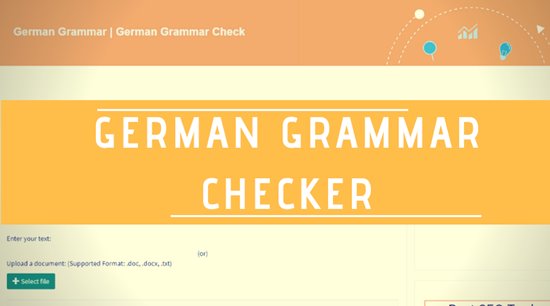

Some examples include:īelow are some examples of how to put the “time, manner, place” rule to practice. German Adverbs Of TimeĪdverbs of manner indicate how something happens and include words such as:įinally, adverbs of place describe where an action takes place. In German, you always need to follow the rule “time, manner, place” when determining adverb word order. The previous example – Er studiert seit September mit seinem Bruder Medizin an der Universität – shows how the word order differs slightly in German compared to English. In a sentence, adverbs tell us about how, when, how often or where something happens. In English they often (but not always) end in “ly” – “quickly”, “angrily”, “actually”. There's A Time, Manner, And Place For German AdverbsĪdverbs, as you probably remember from school, are words that modify verbs, adjectives and even other adverbs. (He has been studying medicine with his brother at the university since September.)Īlthough all nouns are capitalized, pronouns are never capitalized, unless they come at the beginning of the sentence. Er studiert seit September mit seinem Bruder Medizin an der Universität.Wir leben in dem Haus mit meiner Mutter.In German, nouns (words that name people, things and places) are always capitalised.

You may have noticed that the last sentence example capitalized the word Medizin (medicine).

Learn more about verb position in German. However, the rules for these cases are also relatively straightforward.
ONLINE GERMAN GRAMMAR CHECK FREE
If you’re ready to get started, click here for a 7-day FREE trial. With German Uncovered you’ll use my unique StoryLearning® method to learn tricky German grammar naturally through stories. And start expressing yourself in German sooner.īy the way, if you want to learn German fast and have fun while doing it, my top recommendation is German Uncovered which teaches you through StoryLearning®. And by focusing your efforts on the most important rules, like the ones you'll discover in this post, you'll save time and energy. (Despite what the Grammar Villain would have you believe). German grammar is actually simpler than you might imagine. So how do you know where to place those nouns, adverbs, adjectives, and verbs? German sentences appear to follow some sort of jumbled English grammar. In this article, you'll find out the seven basic German grammar rules beginners need to know to start speaking the language right away. Grammar is the framework that creates the structure of every sentence.Įssentially, grammar is a set of rules that helps you communicate accurately by composing sentences in specific ways. Well, the reason is, every language uses different grammar rules to build sentences. If only you could learn German by just memorising translations of words – why isn't language learning that simple?


 0 kommentar(er)
0 kommentar(er)
